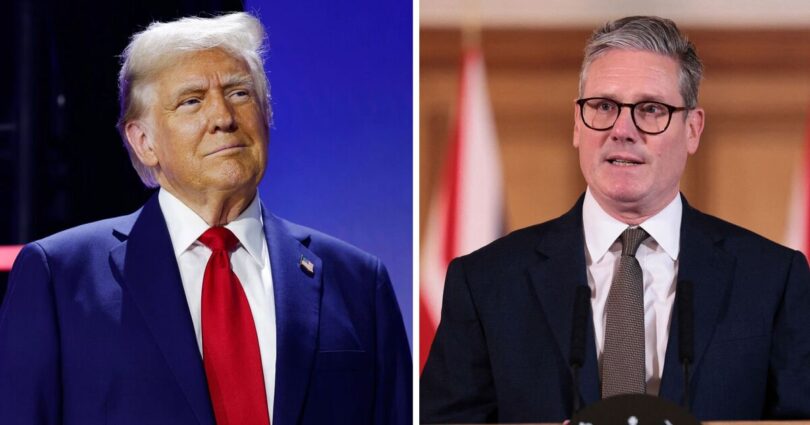The Labour government and incoming Donald Trump administration will have « enough bandwidth » to strike a landmark UK-US trade deal, « if both sides are willing to come to the table and negotiate ».
However, the EU has a trump card of its own that could derail any future deal between Downing Street and the White House, an expert has told Express.co.uk.
Gabriella Macari, Senior Investment Manager at Arbuthnot Latham, said that Labour’s healthy majority and the Republicans’ success in the Presidential Election and Congressional Election, means that both parties are in strong positions to pursue their policy ambitions.
« With both the UK and US administrations on firm footing with majorities in their respective legislature and no elections until 2028, there’s enough bandwidth for a deal to be possible if both sides are willing to come to the table and negotiate », she explained.
The expert did however warn that Trump may be more concerned with protectionism than with giving British companies easier access to US markets, especially given senior Labour figures’ disparaging comments about the incoming president.
Ms Macari explained that « it is likely to be challenging to broker a negotiation between a right-leaning, ‘America First’ US administration and a left-wing British government with Starmer at the helm ».
Nevertheless, « President Trump likes to make a deal ».
Whatever the benefits of a future UK-US trade deal – « new markets for British goods and services » and a broadening out of the markets already open – there’s « no such thing as a free lunch », the expert added.
The expected quid pro quo of any trade agreement would be a « loosening of our own restrictions and regulations on imports », something Britain may be loathed to agree to, given what it would mean for access to European markets.
« Whilst we do have sovereignty to make such concessions, it’s worth highlighting that at present UK regulation is closely aligned with the EU. If British trading standards were to diverge too far from Europe’s to make an agreement with the US, it has the potential to put strain on Anglo-European trade in exchange », Ms Macari said.
« In an extreme case », Brussels could threaten to put up « new trade barriers or tariffs on UK goods entering the EU, affecting businesses with strong ties to European markets ». This would of course bind UK negotiators, keen to pen a deal with Washington.
Despite the challenges, former Bank of England chief economist Andy Haldane said the UK should be pursuing favourable trade deals with the US and EU.
“I hope the government is in a position to really pat its head and rub its tummy at the moment,” he told the Guardian.
“Of course we should pursue energetically an improved deal with the EU, although that won’t be straightforward. The new government committed to that and should keep on committing to that.
“That should not, though, preclude – and does not preclude, as difficult as it will be – seeking out a free trade arrangement with the US under a new Trump presidency.”
Despite the call from Mr Haldane to continue to pursue favourable trading terms with Europe, a German entrepreneur has accused the EU of « ongoing economic suicide » saying its sluggish performance is being blitzed by the United States.
Data from the International Monetary Fund, shared by German businessman Ole Lehmann, shows that around the time of the global financial crash, the Eurozone – which is made up of 20 states from the EU 27 – and US economies were similar in size.
Since then, the US economy has continued to expand at a healthy rate – last year its GDP was £21.5 trillion. The EU’s GDP meanwhile is just £17 trillion. Such is the scale of European decline, Mr Lehmann believes the continent is « on its way to irrelevancy. »
According to research by the European Centre for International Political Economy, a Brussels-based think tank, the economies of individual EU member states doesn’t compare favourably to US states.
As of 2023, Italy was only just ahead of Mississippi, America’s poorest state. Meanwhile, France was sandwiched between rural Idaho and Arkansas, the third and second-smallest US state economies respectively.
Germany didn’t do much better either. The historic powerhouse of the European economy languishes between 38th placed Oklahoma and 39th placed Maine.
Mr Lehmann wrote on X that the « anti-innovation mindset is killing Europe » and, using data from a range of sources, revealed « the devastating truth behind Europe’s ongoing economic suicide ».
The businessman blamed EU member states’ « tax rates crushing small businesses », « compliance costs killing innovation », and employment laws making hiring and firing « impossible ».
Source link








